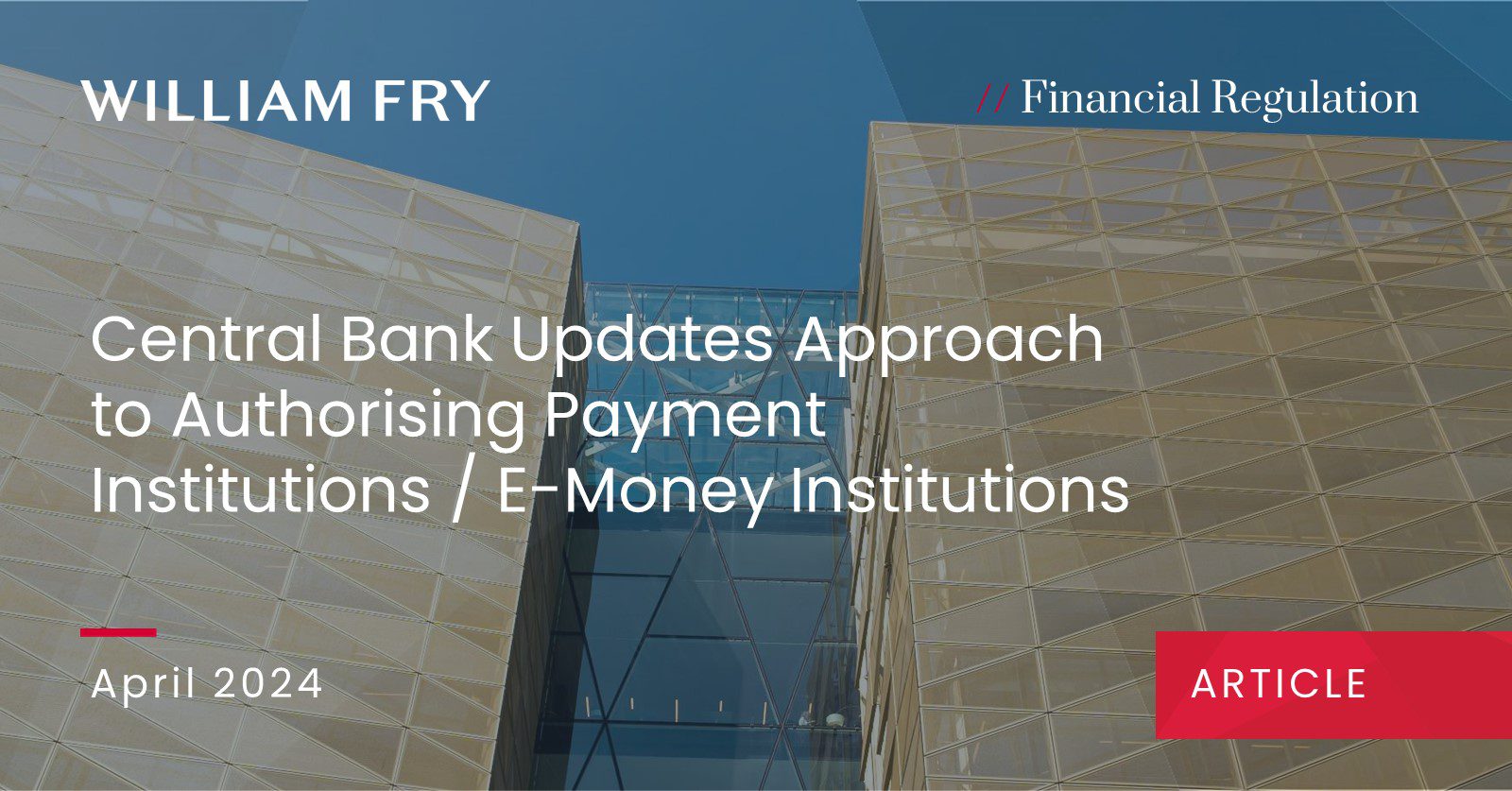On 9 April 2024, the Central Bank of Ireland (the Central Bank) published its updated approach to authorisation of Payment Institutions (PIs) (including registration of Account Information Service Providers (AISPs)) and Electronic Money Institutions (EMIs) in Ireland together with a document setting out its expectations regarding the authorisation/registration of these regulated fintech entities.
The Central Bank recognises that, as one of the largest sub-sectors within the broader fintech universe in Ireland, the authorisation and supervision of firms operating in the PI and EMI sector, is an important and growing part of its mandate.
Document outlining the Central Bank’s expectations
The Central Bank has helpfully published a document setting out the Central Bank’s expectations for PI/EMI authorisation and AISP registration. The expectations contained within this document build on the Central Bank’s experience of authorising and supervising firms in these sectors and its previous communications and guidance to industry. It also aims to clarify aspects of the process for applicant firms and industry bodies. The Central Bank expects that such firms will:
- Protect consumers and safeguard users’ funds.
- Be financially and operationally resilient.
- Have business models which are viable and sustainable.
- Be able to demonstrate an appropriate level of ‘substance’ in Ireland, resulting in firms which are well governed, with appropriate cultures, effective risk management and control arrangements in place.
- Be able to recover critical or important business services from a significant unplanned disruption, while minimising impact and protecting their customers and the integrity of the financial system.
- If they cannot recover, be able to exit the market in a safe and orderly manner.
Updated authorisation/registration process
Whilst the previous application process contained five key stages, the new process will consist of the following three stages:
Stage 1 – Exploratory Stage (consisting of two phases):
This stage is designed to support applicant firms and facilitate constructive engagement.
- Initial Meeting with the applicant firm (Phase 1) – to discuss the contents of the Key Facts Document (KFD) and questions on / requirements for the authorisation/registration process and the applicant firm’s proposed business model, programme of operations and governance framework.Firms seeking to pursue an authorisation/registration application should contact the Payments Authorisation Team to arrange an initial meeting.The Pre-Application KFD must be completed in the prescribed form and submitted by applicant firms to the Central Bank, at least five working days before the initial meeting.
The initial meeting will be an opportunity for the applicant firm to identify any initial matters that might preclude the application from proceeding and any issues/areas of focus which need to be specifically addressed in an application.
The Central Bank aims to acknowledge receipt of application (initial contact) within 3 business days (at least 95% of the time).
- Key Information Check and Initial Assessment (Phase 2) – this phase includes a required document check and an initial assessment of the submission.The inclusion of an initial assessment (as to whether the applicant firm is likely to meet the Central Bank’s expectations) at this stage is one of the main new features of the Central Bank’s updated approach.At the end of this phase, the Central Bank will notify the firm of the outcome which is either:
- Progression – The application can progress to the Assessment Stage and a specific case manager, who will be a key point of contact for the applicant firm, is assigned; or
- Issues have been identified which preclude progression to the Assessment Stage – The Central Bank advises the applicant firm of its reasons not to progress the application to the next stage. In this case, the applicant firm can respond through written submissions and/or meetings.
The Central Bank states that it aims to complete the key information check within 10 business days of receiving the application (at least 95% of the time). However, the Central Bank does not provide a service level commitment regarding the timeline for completion of its initial assessment of an application during the Exploratory Stage.
Stage 2 – Assessment Stage
During this stage, the Central Bank will conduct its formal assessment of the application. This is the point at which the Central Bank’s authorisations service standards 90-working day clock begins to run. The Central Bank may also request:
- Fitness and Probity related (Pre-Approval Controlled Function (PCF) role) assessment interviews; and/or
- additional information requests/detailed assessment meetings regarding the application.
For further information on the Fitness and Probity regime please see our articles here and here.
At the end of the assessment stage, the Central Bank will notify the applicant firm whether it will issue a Minded To Authorise/Register letter or a Minded to Refuse letter.
A Minded To Authorise/Register letter is issued when an applicant firm has positively demonstrated that it will meet all authorisation/registration requirements and expectations. The letter will include any requirements to be addressed before authorisation/registration, conditions to be addressed post-authorisation and the proposed level of capital to be held (where applicable).
A Minded to Refuse letter means that the Central Bank does not propose to grant authorisation/registration of the applicant firm. The applicant firm will be advised of the reasons and can respond through written submissions and/or meetings (for a period advised in the letter).
The 90-working-day service standard clock for the Assessment Stage will be paused where an information request has been issued to the applicant until a satisfactory response has been provided. In addition, the clock can be switched off entirely where any of the following arise:
- Another regulatory authority has to be contacted;
- Persons are subject to interview;
- Significant legal issues arise;
- Significant fitness and probity issues arise;
- The business model is complex or novel in nature;
- Significant changes to the business model, the applicant’s shareholder structure or other key aspects of an application arise during the review process, or where the application becomes dormant; or
- The Central Bank is minded to refuse an application.
The Central Bank aims to complete the assessment phase and notify applicant firms of the outcome within 90 working days of commencing the Assessment Stage (at least 90% of the time).
Stage 3 – Authorisation/ Registration Decision
This is the stage in which the final decision as to authorisation/registration is made. The applicant firm will receive a letter granting authorisation/registration or a letter of refusal.
Letter Granting Authorisation/Registration – Subject to the pre-authorisation/registration requirements in the Minded to Authorise letter having been addressed, no new adverse information coming to the Central Bank’s attention in the interim and agreement from the applicant firm as to proposed conditions and capital (where applicable), a letter granting authorisation/registration will be issued and the applicant firm will then be able to commence its regulated activities.
Letter of Refusal – Where a Minded to Refuse letter has been issued, the Central Bank will review any submissions made by the applicant firm. If the Central Bank is still not satisfied to approve an application following the review of any submissions to a Minded to Refuse letter, it will issue a letter of refusal.
The Central Bank aims to complete the notification of decision phase and notify the applicant firm of the outcome within 10 business days of receipt of satisfactory responses to matters detailed in the Minded to Authorise/Register letter (at least 90% of the time).
Other
When an applicant has not provided an adequate response within 60 working days following the issuance of comments. A Minded to Deem Withdrawn letter is sent to the applicant after 50 working days of comments issued, notifying the applicant that it has 10 working days to provide all outstanding documentation or the application will be considered withdrawn. If the applicant does not respond within the 10 working days, a Deemed Withdrawn letter is sent and the application is not considered further by the Central Bank.
Central Bank Feedback on the Five Key Challenges in Authorisation Assessments
Key challenges encountered by the Central Bank in the context of these authorisation assessments include:
- Inadequate preparation and/or insufficient detail in the application. The Central Bank notes that hiring of senior managers by applicants early in the process tends to facilitate a more complete application and quicker progress through the application process;.
- Lack of clarity around business models and/or changes to description of the business model during the application process;
- Delays by applicants in responding to comments raised by the Central Bank;
- Submission of group risk frameworks / policies / procedures which have not been appropriately tailored to local risks and Irish regulatory requirements; and
- Delays by applicant firms in identifying and proposing candidates for PCF roles and applicant firms putting forward candidates for PCF roles who do not have the necessary qualifications, skills or experience to perform the role.
Contact Us
William Fry’s Financial Regulation Unit has vast experience of working with applicants’ in-house teams to navigate the authorisation process efficiently and cost-effectively. We have acted for numerous authorised entities in these sectors, including one-third of the EMIs successfully granted authorisation in Ireland to date. We can advise you on all aspects of your application for authorisation/registration as a PI/EMI/AISP in Ireland. Please contact Shane Kelleher, Louise McNabola or any member of William Fry’s Financial Regulation unit for legal advice.
Contributed by Jane Balfe



